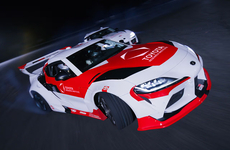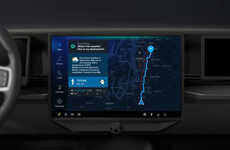
Toyota Research Institute Plays Around with Generative AI
References: prnewswire
Last year, the Toyota Research Institute introduced an innovative generative artificial intelligence technique aimed at enhancing vehicle design capabilities. The new method enables designers to integrate "initial design sketches and engineering constraints" into the early stages of the creative process, streamlining the iterative process for aligning design and engineering aspects.
This approach combines traditional engineering strengths with modern generative AI, allowing designers to incorporate complex considerations like aerodynamic drag, ride height, and cabin dimensions into the generative AI process. It does not only have the capability of enhancing performance but also considerably saving on time. The integration of engineering constraints directly into the design process can expedite the development of electrified vehicles, particularly in optimizing aerodynamics for battery electric vehicles (BEVs) to enhance range.
The Toyota Research Institute also boasts research papers detailing the technique.
Image Credit: Toyota Research Institute
This approach combines traditional engineering strengths with modern generative AI, allowing designers to incorporate complex considerations like aerodynamic drag, ride height, and cabin dimensions into the generative AI process. It does not only have the capability of enhancing performance but also considerably saving on time. The integration of engineering constraints directly into the design process can expedite the development of electrified vehicles, particularly in optimizing aerodynamics for battery electric vehicles (BEVs) to enhance range.
The Toyota Research Institute also boasts research papers detailing the technique.
Image Credit: Toyota Research Institute
Trend Themes
1. AI-empowered Vehicle Designs - Integrating engineering constraints into the generative AI process streamlines the iterative process for aligning design and engineering aspects.
2. Enhancing Performance and Efficiency - Incorporating complex considerations like aerodynamic drag and ride height into the generative AI process improves vehicle performance while optimizing energy efficiency.
3. Expedited Development of Electrified Vehicles - Integrating engineering constraints directly into the design process expedites the development of aerodynamic designs for battery electric vehicles (BEVs) to enhance their range.
Industry Implications
1. Automotive - The integration of generative AI techniques with engineering constraints opens up opportunities for automakers to enhance vehicle designs for better performance and efficiency.
2. Artificial Intelligence - The use of generative AI in vehicle design enables AI developers to explore new ways of incorporating engineering constraints into the creative process.
3. Research and Development - The Toyota Research Institute's innovative generative AI technique has implications for the research and development of vehicle design processes across industries.
3.5
Score
Popularity
Activity
Freshness
























